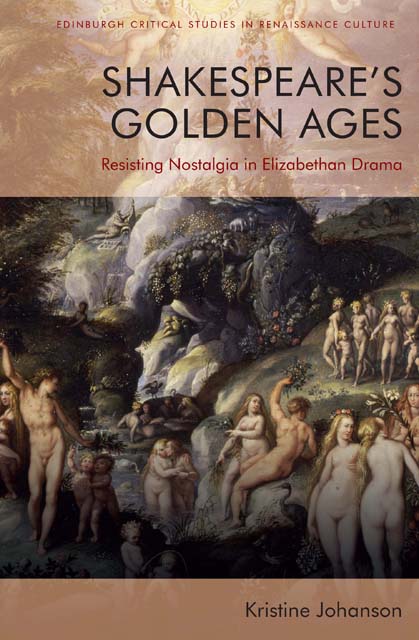Book contents
- Frontmatter
- Contents
- Dedication
- Series Editors’ Preface
- Prologue
- Note on Citation
- Introduction: Rethinking Nostalgia
- 1 Against Nostalgia: Looking Forward to the Future in the Queen’s Men’s Plays and Marlowe’s Tamburlaine
- 2 What Merry World in England? Nostalgic Paroemia and The Second Part of Henry VI
- 3 In the Mean Season: Richard II’s Absent Hospitality
- 4 The Lessons of Nostalgia in Julius Caesar and Sejanus
- Conclusion: Resisting Nostalgia
- Bibliography
- Index
Series Editors’ Preface
Published online by Cambridge University Press: 18 November 2022
- Frontmatter
- Contents
- Dedication
- Series Editors’ Preface
- Prologue
- Note on Citation
- Introduction: Rethinking Nostalgia
- 1 Against Nostalgia: Looking Forward to the Future in the Queen’s Men’s Plays and Marlowe’s Tamburlaine
- 2 What Merry World in England? Nostalgic Paroemia and The Second Part of Henry VI
- 3 In the Mean Season: Richard II’s Absent Hospitality
- 4 The Lessons of Nostalgia in Julius Caesar and Sejanus
- Conclusion: Resisting Nostalgia
- Bibliography
- Index
Summary
Edinburgh Critical Studies in Renaissance Culture may, as a series title, provoke some surprise. On the one hand, the choice of the word ‘culture’ (rather than, say, ‘literature’) suggests that writers in this series subscribe to the now widespread assumption that the ‘literary’ is not isolable, as a mode of signifying, from other signifying practices that make up what we call ‘culture’. On the other hand, most of the critical work in English literary studies of the period 1500–1700 which endorses this idea has rejected the older identification of the period as ‘the Renaissance’, with its implicit homage to the myth of essential and universal Man coming to stand (in all his sovereign individuality) at the centre of a new world picture. In other words, the term ‘culture’ in the place of ‘literature’ leads us to expect the words ‘early modern’ in the place of ‘Renaissance’. Why, then, ‘Edinburgh Critical Studies in Renaissance Culture’?
The answer to that question lies at the heart of what distinguishes this critical series and defines its parameters. As Terence Cave has argued, the term ‘early modern’, though admirably egalitarian in conception, has had the unfortunate effect of essentialising the modern, that is, of positing ‘the advent of a once-and-for-all modernity’ which is the deictic ‘here and now’ from which we look back. The phrase ‘early modern’, that is to say, forecloses the possibility of other modernities, other futures that might have arisen, narrowing the scope of what we may learn from the past by construing it as a narrative leading inevitably to Western modernity, to ‘us’. Edinburgh Critical Studies in Renaissance Culture aims rather to shift the emphasis from a story of progress – early modern to modern – to a series of critical encounters and conversations with the past, which may reveal to us some surprising alternatives buried within texts familiarly construed as episodes on the way to certain identifying features of our endlessly fascinating modernity. In keeping with one aspect of the etymology of ‘Renaissance’ or ‘Rinascimento’ as ‘rebirth’, moreover, this series features books that explore and interpret anew elements of the critical encounter between writers of the period 1500–1700 and texts of Greco-Roman literature, rhetoric, politics, law, oeconomics, eros and friendship.
- Type
- Chapter
- Information
- Shakespeare’s Golden AgesResisting Nostalgia in Elizabethan Drama, pp. vii - ixPublisher: Edinburgh University PressPrint publication year: 2022

